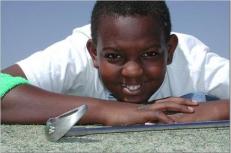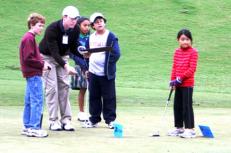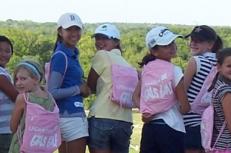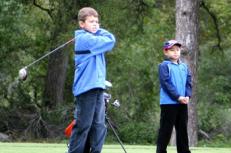Forefront talked with John Ellett, founding director of The First Tee of Greater Austin, a youth-services organization that promotes character development and life-enhancing values through the game of golf. Over the last decade, The First Tee has enrolled more than 10,000 youth in Austin, with annual participation now approaching 1,500.
Austin seems to have a rich history with the game of golf. Have you embraced any of that history with your efforts at The First Tee?
We have embraced it on a variety of fronts, but let me illustrate one. Harvey Penick, a legendary teacher of golf, resided here in Austin and wrote one of the all-time best-selling sports books, called The Little Red Book. In it he provides many insights into the game, the players, and his approach to encouraging each and every student individually. As he saw it, his challenge was to match the swing instruction to the individual and his or her unique personality. Each person was unique, so each lesson needed to be unique. However, in his teachings there is one universal lesson, a lesson that he says is his most important lesson for both golf and life: “Take dead aim.” I find it very interesting to see how many ways we can apply that very simple lesson to all aspects of what we do. Much of what we do with the Life Skills Program centers on this simple concept.
Most people are not familiar with how the Life Skills Program was developed. Can you highlight for us how it came in to existence?
The Austin chapter of The First Tee spent two years leading and participating in a group of 10–12 professionals from around the country to develop a curriculum that is now being delivered nationally to over 250,000 youth annually. This curriculum is grounded in 50-plus years of research from the Search Institute, was professionally developed by the Stanford Research Institute, creates lessons and experiences around nine values and five life skills, utilizes the golf course as the classroom, and leverages the game of golf as a metaphor for life.
The First Tee program is based on helping kids develop a positive value system. Why is this important?
At the core, a value system will help shape and influence the decisions a person makes. If your values are based on deception, fear, and concern for self, you will make different decisions than a person whose core values include integrity, respect, and honesty. Developing these values early is an important step to becoming a successful and productive member of society.
Take Action
How does developing a positive value system affect a kid’s life?
While it seems like an esoteric concept, especially for a kid, an individual’s value system has a direct effect on the opportunities he or she has in life. We see direct application of a positive value set to quality decisions and ultimately to long-term success. As an example, research shows that our kids not only stay in school longer, but also have more success while they are there.
Personal values inform our everyday decisions. Let me give you an example using the value “perseverance.” If a kid playing golf hits a ball poorly several times, that kid has a choice: do I keep doing what I am doing and hope for a better outcome, do I assess my situation and make adjustments and then keep going, or do I give up and go do something else? Now let’s translate this same challenge to the classroom. The same kid gets a bad grade on an important test: do I not worry about it and move on, do I evaluate why I scored poorly and make adjustments (study harder, ask more questions of the teacher in areas I don’t understand), or do I decide it is just too much work to be able to do well and give up altogether?
A youth who has developed a sense of perseverance and the self-assessment skills we teach will stick to it and continue until he or she hits the ball onto the green or passes the test. In the above example, the consequence of possessing this value may be greater self-confidence and the gratification of achieving a goal. The development and application of this value in everyday life has created greater short-term and longer-term opportunities.
Can you give us an example of a student who has created an opportunity by developing these values?
Preston is a great example of a student who took the lessons from his First Tee experience and applied them in other areas of his life. Preston came to us in seventh grade as a very athletic and hard-working kid. But like all kids, he sometimes lacked the ability to turn his vision into a concrete plan. Like many his age, he was vulnerable to negative peer pressure at school that threatened to derail his academic progress.
Preston took to the program like a fish in water; I’ve never seen someone set goals the way he did. He was incredibly successful at the program and easily achieved his first big goal of making the varsity golf team. His biggest accomplishments, however, came off the course as Preston graduated high school in the top echelon of his class and went on to become one of a handful of First Tee National Scholars. His application of the lessons learned during high school continued through college: he just recently graduated with honors from Texas State University, led the school’s business club to its first-ever top-20 finish in national competition, and, most recently, started his own business at the ripe old age of 21.
Read more of Preston’s story here in his own words.
Take Action
What is a lesson that all parents can take away from what you’ve developed at The First Tee?
We teach our nine core values through the program, but we don’t hammer the kids over the head with the values every day; we use real-time examples in the game to help them understand and develop these values over time and ask the kids how they might apply the values. We ask open-ended questions so the kids learn to think for themselves.
One of the most important skills we teach is goal setting. This seems to be the one that applies to all facets of life, forever. Creating the ability for a person to look forward and identify an outcome that is important to him or her is critical to long-term individual success.
Read more about the skills The First Tee teaches
The key step in this process is being able to create or identify small steps towards a larger goal. When teaching students about goal setting, we ask them, “How many strokes is it going to take you to get from here to the hole?” That can mirror a discussion about how many hours they need to study each night to get an A on their next history test. This kind of experience with goal setting helps students move beyond the vague and aimless direction that can be so common in youth, and provides them with a bit more focus. With practice, they can dream about the possibilities of the future and create specific goals to work towards that place. Setting goals gives them a sense of purpose, and achieving them gives them a sense of accomplishment. As Harvey says, “Take dead aim.”
How would the community be different if all kids developed a strong sense of confidence, perseverance, and integrity?
In today’s society, we spend far too much time and money on remediation and punishment. Putting more emphasis at an early age on the development of simple, positive core values would greatly stem the poor decisions being made later in life. I believe it is a simple tradeoff: the better we do at developing our young people, the more likely they are to become successful young adults.
At The First Tee, while we hope that the youth will develop a lifelong love of golf, our ultimate goal is to help them learn, grow, and develop into tomorrow’s productive citizens armed with the skills to face life’s everyday challenges. In the end, we are enabling them to create unique and positive opportunities for themselves.
















Comments
Agreed - great article John
What a great way to help kids join a sport with such high barriers to entry. Way to build life long skills!